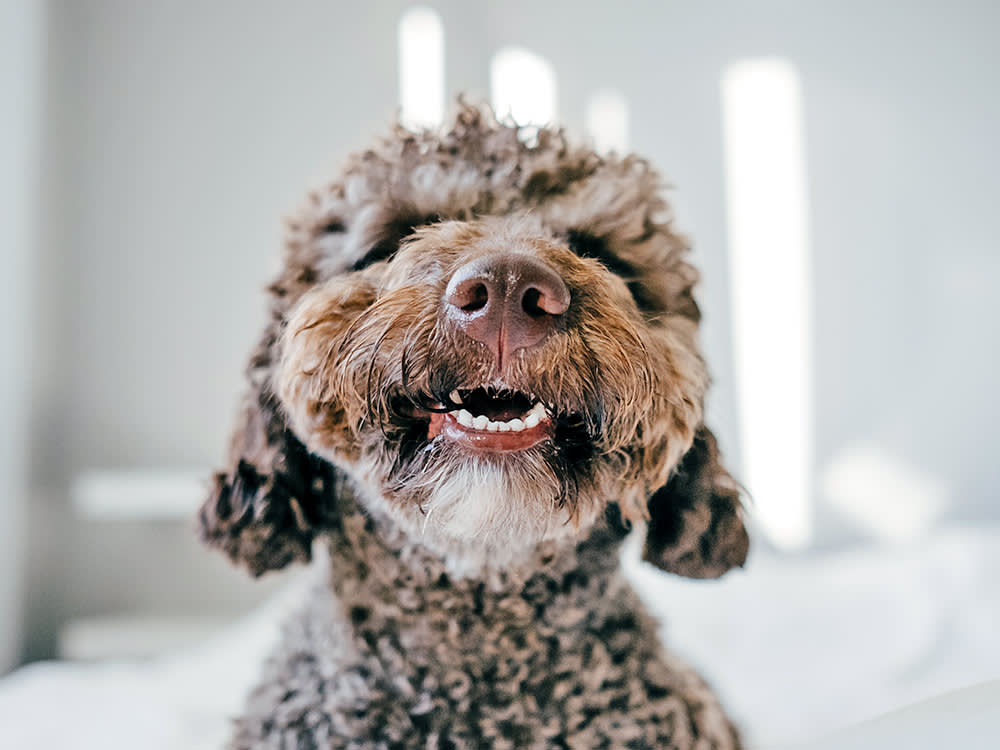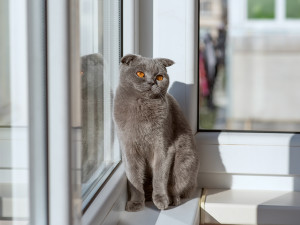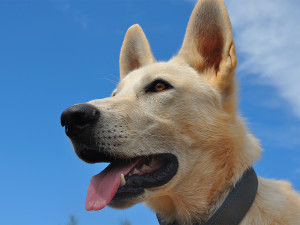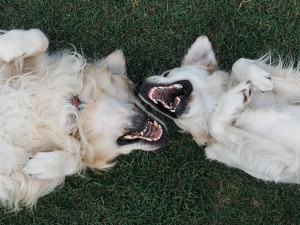Why Are My Dog’s Teeth Chattering and What to Do
We can help you get to the bottom of the issue.

Share Article
In This Article:
Why Are My Dog's Teeth Chattering?opens in a new tab When to See a Vet for Teeth Chatteringopens in a new tab What to Do About Your Dog’s Teeth Chatteringopens in a new tab
Dogs can have all kinds of symptoms and behaviors that show there’s something wrong with them. One worrying behavior is when your dog’s teeth are chattering. We tend to think a dog’s teeth chattering means that they’re very coldopens in a new tab or even scared (think Scooby Doo), but these are far from the only reasons that a dog's teeth might be chattering.
Your dog’s teeth chattering can mean many different things, and some are more serious than others. The most common causes of teeth chattering veterinarian Dr. Elliott Garberopens in a new tab sees include “dental disease, neurological conditions, and even behavioral responses like excitement or anxiety,” he says. In older dogs, periodontal disease is “most often the culprit,“ and “gastrointestinal problems like nausea or reflux can also first reveal themselves through teeth chattering or grinding.”
However, chattering teeth in dogs isn’t always a symptom of a medical or dental issue. Interestingly, says Garber, “we also see storm aversion or phobia as a somewhat regular cause of teeth chattering in parts of the country that experience regular thunderstorms.”

littleKin™ is Kinship’s home just for puppy and kitten parents. Bop over to check out expert advice, new pet tools, and special deals—all curated for your newest family member.
opens in a new tabIf you’re worried about your dog’s teeth chattering, read on – we can help you get to the bottom of the issue.
Main takeaways
Your dog’s teeth can chatter for straightforward reasons, such as their being cold or excited.
Teeth chattering can also be a symptom of serious neurological conditions, so it’s worth seeing a veterinarian.
If your dog’s teeth chattering is accompanied by other, more worrying symptoms, you should also call your vet.
Why are my dog's teeth chattering?
A dog's teeth can chatter for a number of reasons.
Dental or oral pain
One of the main reasons your dog’s teeth might be chattering is dental or oral pain, particularly if they are older or appear to be avoiding food. “Classic signs of oral pain in dogs include excessive drooling, dropping food while eating, pawing at the mouth, and bad breath,” says Garber. “These symptoms often indicate dental disease that needs professional attention." These diseases could include periodontal disease, an abscess, a rotten tooth, and more. If you suspect your dog is experiencing dental or oral pain, you should go straight to your vet.
TMJ
If you’re a chronically stressed person or an avid teeth-grinder, you might have been diagnosed with temporomandibular joint disorder (TMJ). While you might not think your dog has much to worry about, they can also get TMJ disorder. If your dog’s teeth are chattering and they appear to be in jaw pain, the cause of the chattering could be TMJ disorder. If you take your dog to the vet and they suspect TMJ disorder, they will open and close your dog’s mouth and feel for grinding and resistance. They may also need to give your dog X-rays.
Gastrointestinal issues
If your dog’s teeth are chattering, it could also be a symptom of gastrointestinal (GI) issues. You can look out for other symptoms, including “reduced appetite, vomiting, diarrhea, and visible discomfort or restlessness,” says Garber. While it’s normal for dogs to eat grass, Garber says that if your dog has GI issues, you might also notice your dog eating grass more frequently. If you suspect gastrointestinal discomfort, you should see your vet.
Anxiety
While the image of Scooby Doo’s teeth chattering is funny, your dog’s teeth chattering could be a symptom of anxiety. If your dog is in a stressful situation, you might notice their teeth chattering. Luckily, this isn’t too much of a cause to worry. Once they are out of that stressful situation, the anxiety should subside, and their teeth should stop chattering.
Seizures
One of the scariest reasons why a dog’s teeth might be chattering is if they are about to have or had a seizure. If you suspect this, you should see a veterinarian immediately. Neurological conditions, such as focal seizures (which only affect one half of the brain) may show up as jaw chattering. If a dog is having a seizure, they may space out and won’t respond to you. There are other symptoms, such as pacing or becoming clingy. If in doubt, you should absolutely call your vet.
Pheromones
Some dogs, particularly male dogs, may chatter their teeth after smelling a particularly interesting female dog’s pheromones. In fact, female dogs may also do this. According to scientists, dogs do this to try to smell the scent better by bringing the smell into the scent organ on the roof of their mouths. The smell and excitement can also overload their nervous system, leading to that chattering.
Ear infection
A more worrying reason for your dog’s teeth chattering is a potential ear infection. Infections of the ear can be very painful for dogs, and can be dangerous if left untreated. "With ear infections, dogs typically show head tilting, scratching at the ears, redness or discharge in the ear canal, and a distinct odor,” Garber says. “You might also notice them rubbing their head against the furniture." If you suspect your dog has an ear infection, you should contact the vet immediately.
Neurological disorders
One highly worrying reason for teeth chattering is that a dog is suffering from a neurological disorder. "Neurological disorders often present with symptoms beyond teeth chattering, such as disorientation, loss of balance, unusual eye movements, or changes in behavior,” Garber says. If you notice these symptoms along with teeth chattering, says Garber, you should contact your vet: “These symptoms require immediate medical evaluation.”
Excitement
If your dog’s teeth are chattering suddenly and they are in an overwhelming or fun environment, they might just be very excited. Keep an eye on whether or not their teeth chattering continues after they have left the exciting environment. If so, you might need to seek medical attention. However, if the chattering starts when they are excited and ends when the excitement has passed, you do not need to worry.
When to see a vet for teeth chattering
A dog’s teeth can chatter for any number of reasons, including ones as normal and every day as being cold or excited. However, there are also many serious reasons for a dog’s teeth chattering, ranging from ear and tooth infections all the way to seizures and neurological disorders. So when do you actually make that call to the vet?
“Any persistent teeth chattering, especially when accompanied by drooling, head shyness, or difficulty eating, warrants immediate veterinary attention,” Garber says. If you notice these symptoms, he adds, “it could indicate serious underlying conditions requiring treatment."
What to do about your dog’s teeth chattering
If your dog is just excited or cold, you don’t need to do anything about their teeth chattering, and there’s nothing to be worried about. However, if there are additional symptoms, you should contact your vet.
"Any teeth chattering that persists for more than a day, occurs frequently, or is accompanied by other concerning symptoms should be evaluated by a veterinarian to rule out serious conditions,” Garber says. The vet can be expensive, but your dog’s health is worth it. If in doubt, you should seek out an additional opinion from your dog’s veterinarian.
References
Carl, K. “My Dogs Teeth Are Chattering: What Does It Mean.” Lincolnway Veterinary Clinic, 15 Nov. 2021, lincolnwayvet.com/blog/my-dogs-teeth-are-chattering-what-does-it-mean/.opens in a new tab
Kos-Barber, Heidi. “Dog Teeth Chattering: What You Need to Know.” Petmd.com, PetMD, 30 Dec. 2021.https://www.petmd.com/dog/symptoms/dogs-and-teeth-chattering-what-you-need-knowopens in a new tab

Marianne Eloise
Marianne Eloise is a writer for outlets like The Cut, the Guardian and the New York Times. She is also the author of an essay collection Obsessive, Intrusive, Magical Thinkingopens in a new tab. She has been going on adventures with her dog Bowie since she was 17.
Related articles
- opens in a new tab
What Is the Best Way to Clean a Dog’s Teeth?
![Woman brushing her dog's teeth at home.]() opens in a new tab
opens in a new tabHow Often Should You Brush Your Dog’s Teeth?
Some things you can do to keep those chompers sparkling through their senior years.
![Happy dog with teeth visible, blue sky background]() opens in a new tab
opens in a new tabDoes Your Dog Need a Dentist?
NYC’s top veterinary dentist on bad breath, dental disease, and brushing your dog’s teeth...daily.
![a pair of English cream retriever dogs wiggle around on their backs with big grins on their faces]() opens in a new tab
opens in a new tab80% of Dogs Have a Dental Disease — Does Yours?
Here are four common dental problems your pup might face and how to treat them.
![a woman pets her dog in a coat while outside in the snow]() opens in a new tab
opens in a new tabHow Cold Is Too Cold for Dogs?
If your teeth are chattering, theirs probably are, too.
- opens in a new tab
Why Does My Dog Keep Shaking Their Head?
They can’t be saying no that much.







